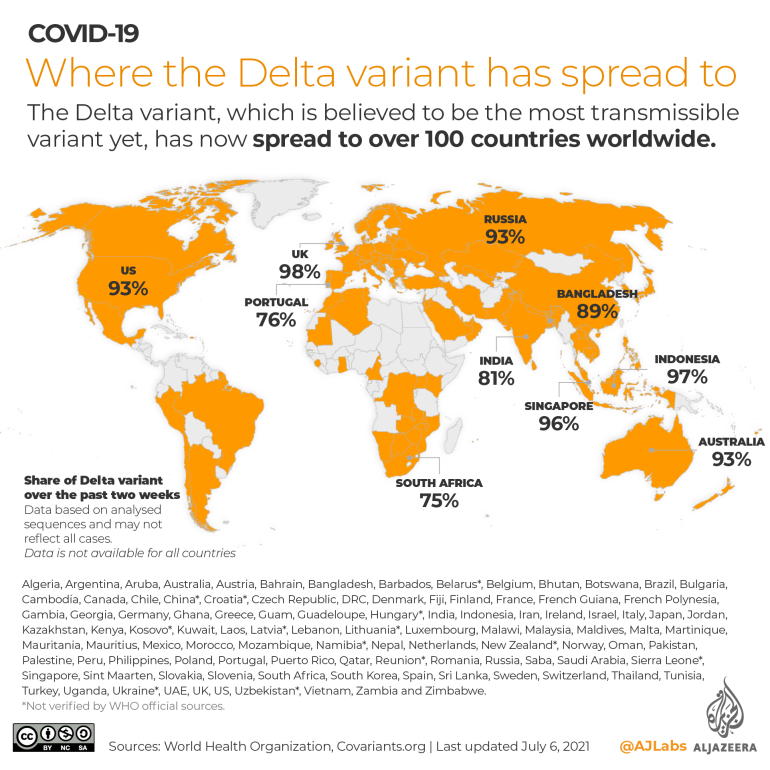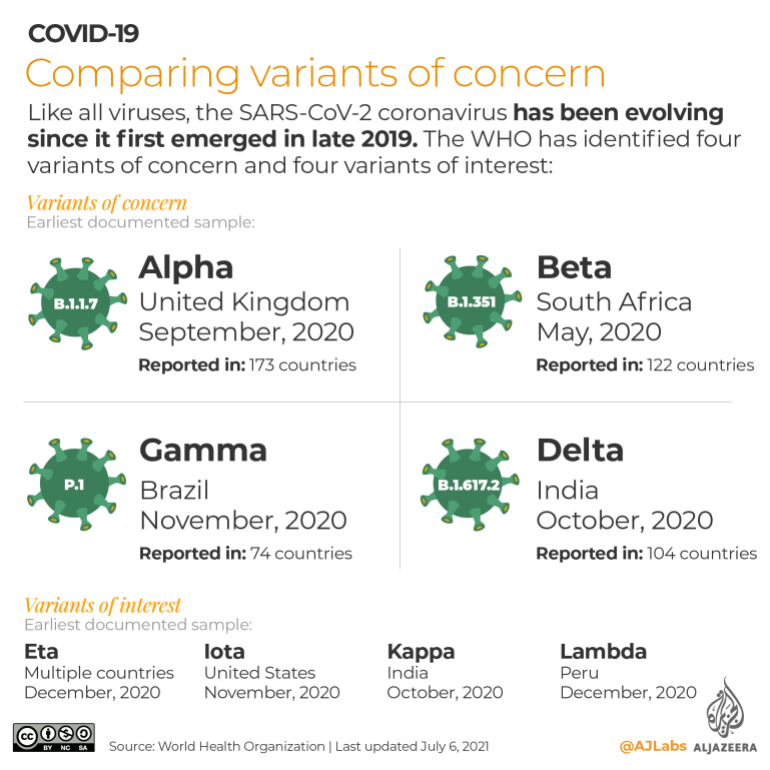7 Jul 2021
The Delta variant of SARS-CoV-2 has now been detected in more than 100 countries and in the coming months, it is expected to become the dominant strain globally, spreading quickly in countries with both low and high vaccination coverage, according to the head of the World Health Organization (WHO).

Delta, which was designated as a variant of concern in May, is believed to be the reason behind a vicious second wave of the virus in India, with daily new infections that month in the country exceeding 400,000.
Dozens of countries including South Africa, Bangladesh, Indonesia, Thailand have implemented new travel bans or tighter lockdown restrictions in an attempt to stop the spread of the virus.
The Delta variant was first detected in India in October 2020. By June 1, it had spread to 62 countries. Two weeks later, it had been found in 80 countries and by July 4, the number had risen to 104. Kazakhstan, Laos, Latvia, Lebanon, Namibia, Oman and Sierra Leone are the latest countries to confirm the presence of the Delta variant.

See an interactive version of the map above here:
Algeria, Argentina, Aruba, Australia, Austria, Bahrain, Bangladesh, Barbados, Belarus*, Belgium, Bhutan, Botswana, Brazil, Bulgaria, Cambodia, Canada, Chile, China*, Croatia*, Czech Republic, DRC, Denmark, Fiji, Finland, France, French Guiana, French Polynesia, Gambia, Georgia, Germany, Ghana, Greece, Guam, Guadeloupe, Hungary*, India, Indonesia, Iran, Ireland, Israel, Italy, Japan, Jordan, Kazakhstan, Kenya, Kosovo*, Kuwait, Laos, Latvia*, Lebanon, Lithuania*, Luxembourg, Malawi, Malaysia, Maldives, Malta, Martinique, Mauritania, Mauritius, Mexico, Morocco, Mozambique, Namibia*, Nepal, Netherlands, New Zealand*, Norway, Oman, Pakistan, Palestine, Peru, Philippines, Poland, Portugal, Puerto Rico, Qatar, Reunion*, Romania, Russia, Saba, Saudi Arabia, Sierra Leone*, Singapore, Sint Maarten, Slovakia, Slovenia, South Africa, South Korea, Spain, Sri Lanka, Sweden, Switzerland, Thailand, Tunisia, Turkey, Uganda, Ukraine*, UAE, UK, US, Uzbekistan*, Vietnam, Zambia and Zimbabwe.
*Not verified by WHO official sources.
Variants of concern: Alpha, Beta, Gamma and Delta.
Like all viruses, the SARS-CoV-2 coronavirus is evolving. Sometimes, these new variants emerge and then disappear. Other times, variations allow the virus to spread more easily and quickly which may lead to more cases of COVID-19. An increase in cases creates a greater strain on a country’s healthcare resources and may lead to more hospitalisations and deaths.
The WHO has identified four such variants of concern: Alpha, Beta, Gamma and Delta; and four variants of interest: Eta, Iota, Kappa and Lambda.
Among the four variants of concern, Delta is believed to be the most transmissible variant yet. The Delta variant is estimated to be between 40 and 60 percent more transmissible than the Alpha variant, which was first detected in the UK, according to a number of studies.


